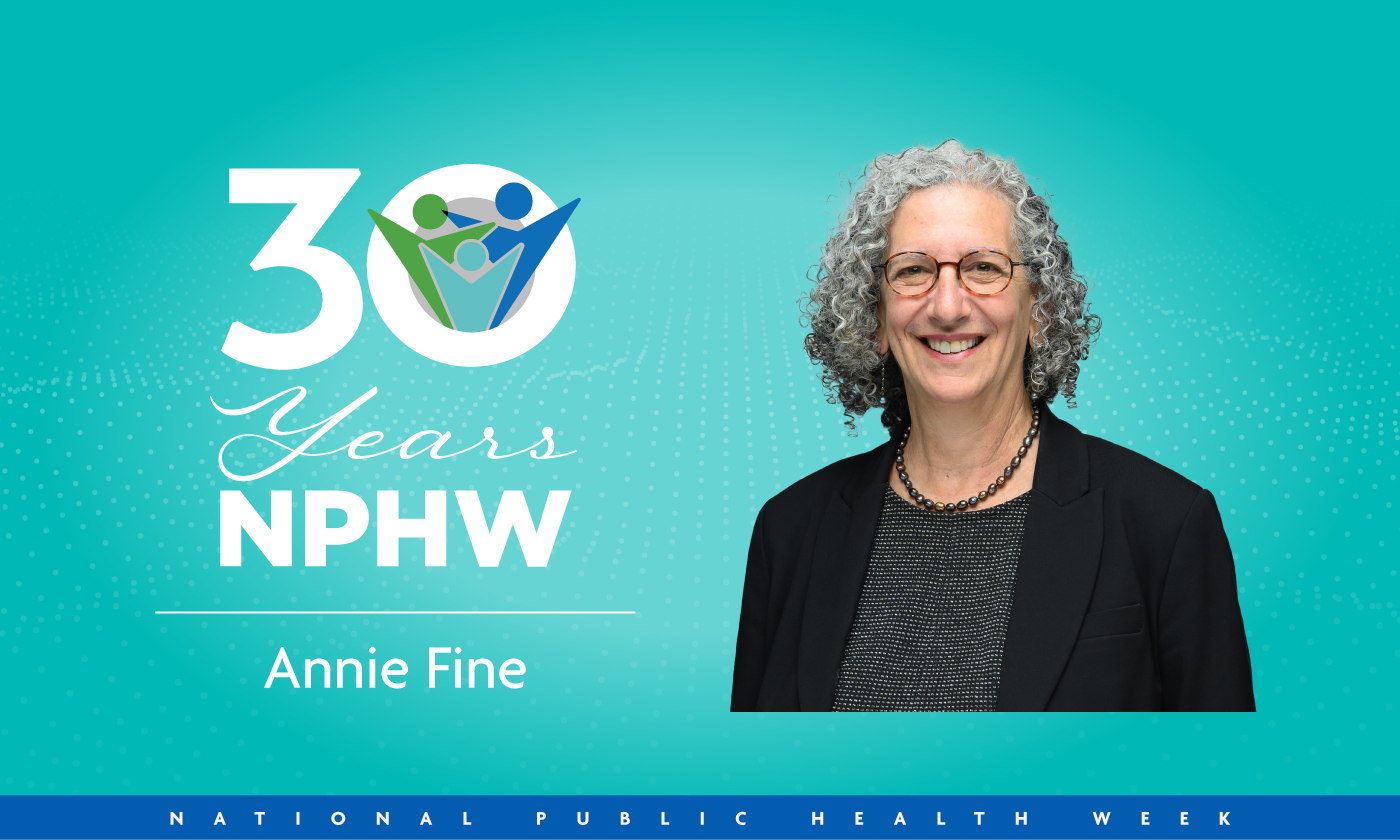On Eve of Retirement, CSTE’s Annie Fine Reflects on A Remarkable Career
By Ben Warden, CSTE Staff

CSTE Chief Science and Surveillance Officer Annie Fine, MD, began her career as a pediatrician in an under-resourced area of Northern California with elevated crime rates. As violence permeated the community for months, Dr. Fine kept thinking about what could be done upstream to prevent tragic outcomes.
It was just that: a thought. Until a particularly gut-wrenching day drove her towards a career change to public health. After prescribing amoxicillin for a 10-month-old with an ear infection, the mother got up to leave. Fine noticed she was on crutches.
“I asked what happened, and the mom said, ‘Oh, I was shot in a drive-by. And so was he.’ So the 10-month-old still had a bullet in him,” Fine said. “I thought, ‘Here I am handing out amoxicillin, but the real problems facing these people and this community are violence and the social milieu that they're living in.”
The experience was the catalyst for Dr. Fine to leave patient care and begin her long, storied career in public health. She was accepted into CDC's Epidemic Intelligence Service (EIS) program, a two-year, post-graduate training program in applied epidemiology where participants gain experience investigating and responding to public health threats. Although tackling violence prevention was an initial inspiration for her change, Fine switched her focus to infectious diseases, which was a major need and focus of CDC at the time.
“I ended up being assigned to New York City and going into communicable disease,” Fine said. “Which was something I was quite interested in.” Fine ended up spending 25 years at the NYC Department of Health, facing everything from 9/11, anthrax, SARS and many other crises. “While going through all of those emergencies it became very clear that we did not have good data systems,” Fine said. “We didn't have good ways to integrate the epidemiologic sides of the data that we were collecting with the laboratory data that we needed. The systems just were not efficient at all.”
Fine was then tasked to create a better system for use in large-scale emergencies. She looked to a software system already in use by the Massachusetts Department of Public Health and built a flexible infrastructure that was able to link epidemiology investigations and cases with lab results, all in one system.
“That was a giant learning experience and something I'm really proud of,” Fine said. “We then used that system to respond to Ebola, to Zika, to Legionnaires' disease in the South Bronx, which was a large outbreak in 2015. And then also finally to COVID, too.” Fine said that building the system meant New York City was better prepared than most to handle the early days of COVID. But the sheer scale of the outbreak still made it incredibly challenging and overwhelming. “None of us were prepared for the scale, the number of people that died so quickly and the lack of personal protective equipment and the lack of diagnostics,” she said.
After guiding New York City through the worst pandemic in modern times, Annie decided to make a professional change. In June 2021, she accepted a position with CSTE as its first-ever Chief Science and Surveillance Officer. She longed to bring her on-the-ground experience to the national level. “The ability to impact national level policy and help build capacity across all country was just such a great challenge and inspiring opportunity,” she said. “I was hoping to bring my frontline experience of what it actually takes to make systems work and how to use the data.”
Reflecting on her time at CSTE, Annie lauded the growth of her team, as well as the broader membership and community of CSTE. When asked about specific accomplishments she’s most proud of, Annie mentions the Stories from the Field project, the Electronic Case Reporting Workgroup and the National Syndromic Surveillance Program Community of Practice.
Fine recently announced her retirement, but will stay with CSTE in a part-time role. As changes and uncertainty still swirl around public health, Fine’s message to younger colleagues in the field is simple: Hang in there. “Public health needs are not going to go away,” Fine said. “It may look different, and it may be organized and funded differently. But hang in there, because science and epidemiology are still going to be needed.”
Through decades of dedication, Annie has not only helped advance our understanding of public health but also inspired countless colleagues and future scientists. Her work has saved lives, shaped policies, and strengthened communities, leaving a lasting impact that will resonate for years to come. CSTE—and health writ large—will miss her tremendously.
“Going into public health was literally the best decision I ever made,” she said. “I love the work, and I love the people.”